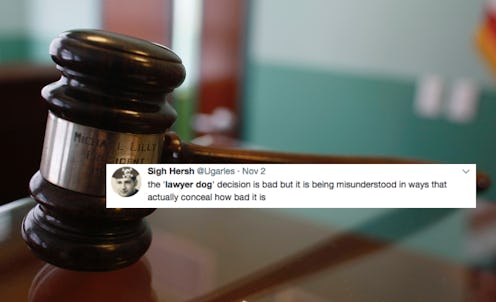
The Sixth Amendment to the U.S. Constitution outlines rights for people who have been accused of a crime, and one of those rights is the ability to request legal defense. In a case out of Louisiana, the Louisiana Supreme Court denied a Black man's request to have incriminating statements thrown out after ruling that asking for "a lawyer, dog," wasn't a request for legal counsel. Warren Demesme, 24, is accused of raping a juvenile, according to the Washington Post, and he made the "lawyer dog" request during an October 2015 interview with police. He admitted to the crime later in the interview, but wanted to get that confession thrown out because he wasn't provided legal counsel. The court ruled in a 6-1 decision that he was asking for a "lawyer dog" based on a transcript of the interview which omitted a comma between "lawyer" and "dog," ignoring the fact that a "lawyer dog" would be both an unusual and nonsensical request.
Louisiana Associate Supreme Court Justice Scott Crichton shared his thoughts about the ruling in a written opinion. He wrote, "In my view, the defendant’s ambiguous and equivocal reference to a 'lawyer dog' does not constitute an invocation of counsel that warrants termination of the interview." Let's get one thing straight: Demesme was definitely not asking for a canine lawyer.
It's possible to be disgusted at the charges Demesme is facing — alleged sexual assault of two underage girls — while also being troubled by the judicial response. If Demesme committed the crime he's being held for, he should be charged accordingly, but this ruling speaks to a bigger issue: Why are Black people dismissed and even denied due process as a result of using African American Vernacular English (AAVE)?
By many accounts, AAVE is a legitimate and neutral dialect, no better or worse than British English, and it dates back to the days of African slave trading. In recent years, AAVE has been viewed through a different lens — white people appropriating the dialect, for example, and often misusing words in the process. The Huffington Post's Zeba Blay addresses this phenomenon in a magnificent article entitled, "12 Words Black People Invented, And White People Killed."
But many people still refuse to acknowledge AAVE as legitimate. Some of the conversations regarding AAVE (sometimes called Ebonics) and its common usage take place on websites like Stormfront, a haven for white supremacists. Why don't Black people talk properly, they ask? Comedian Bill Cosby even got in on the conversation in an infamous 2004 speech that called out problems in the Black community (this was before the allegations of sexual assault against over 60 women came out in the press). Why don't Black people speak English, he asked?
Just forget telling your child to go to the Peace Corps. It’s right around the corner. It’s standing on the corner. It can’t speak English. It doesn’t want to speak English. I can’t even talk the way these people talk. “Why you ain’t where you is go, ra,” I don’t know who these people are. And I blamed the kid until I heard the mother talk. Then I heard the father talk. This is all in the house. You used to talk a certain way on the corner and you got into the house and switched to English. Everybody knows it’s important to speak English except these knuckleheads. You can’t land a plane with “why you ain’t…” You can’t be a doctor with that kind of crap coming out of your mouth. There is no Bible that has that kind of language.
What Cosby and white supremacists are both missing is that not only is AAVE an extraordinarily common dialect among Black people, it is also a legitimate form of speech. Nearly one-third of Louisiana's residents are Black, and you'd think that AAVE would be understood, to some degree, by the state's highest court based on the proportion of its Black citizens. But when major agencies and organizations have recognized AAVE in the past, they've faced an uproar. In 2010, the Drug Enforcement Administration put out a call for "Ebonics translators" and was met with ridicule. And in 1996, the school board in Oakland, California recognized Ebonics as an official language and was met with criticism from the likes of Maya Angelou and Rev. Jesse Jackson.
When someone using AAVE is thought of as "ghetto" or "black-sounding" rather than a neutral use of language, discrimination is the result. When it's viewed as an illegitimate way of communicating, we run into issues like Demesme's case that can be passed off as miscommunications, but are actually examples of systemic racism at work. Crichton's written opinion explaining the Supreme Court's decision gives us a glimpse at how problematic the court's reasoning is. The state court is confident in its ruling, but the precedent it could set is disturbing.